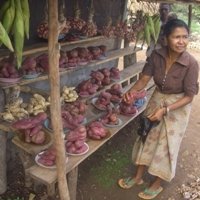
Tuesday, 16 April 2013
The golden flesh of new sweet potato varieties is proving to be very valuable in one of the world's poorest nations, Timor-Leste.
Thanks to the new varieties, farmers in the young tropical nation not only have a more reliable crop that out-yields the local varieties of sweet potato, they can also produce a highly nutritious food.
Professor William Erskine, Director of The University of Western Australia's Centre for Legumes in Mediterranean Agriculture (CLIMA) and UWA Institute of Agriculture, is co-author of a study which outlines the uses of sweet potato in a country that is third in a UN ranking of countries with the highest percentage of chronically malnourished children.
In Timor-Leste, sweet potato is mainly a breakfast or snack food. It is boiled in water, baked or roasted over an open fire or fried in oil.
Published in the journal Field Crops Research, the study shows how the new varieties are helping to improve life for Timor-Leste's 1.1 million people, of whom more than 80 per cent are subsistence farmers.
CLIMA; UWA's Institute of Agriculture; the Ministry of Agriculture, Forestry and Fisheries in Timor-Leste; and the Seeds of Life Program collaborated on the 198 farmer-managed trials over the 2006 - 2007 and 2007 - 2008 growing seasons. The Project is supported by AusAID and Australian Centre for International Agricultural Research (ACIAR).
Whether the sweet potato varieties were planted in a mixed plot with maize, cassava, beans and/or yams and whether the plots were weeded or not had no effect on the sweet potato yield. The varieties also produced a sweet potato that was more marketable because of its smooth skin and flesh and regular shape.
One of the varieties, which is high in calories and has good levels of beta-carotene (the red/orange pigment in plants that is a source of vitamin A), is likely to help prevent calorie malnutrition as well as vitamin A deficiency, which can cause cancer, birth defects, impaired immune function and night blindness. Sweet potato stores well and maintains its beta-carotene for at least 50 days. It is also retained during cooking.
The study was unique in involving farmers in the trials and in interviewing them after harvest. "The farmers were asked about characteristics in the local and test varieties and whether they would re-plant and why," the authors write. The new varieties are being widely adopted across Timor-Leste.
Media references
Professor William Erskine
(UWA Centre for Legumes in Mediterranean Agriculture and UWA Institute of Agriculture) (+61 8) 6488 1903
Michael Sinclair-Jones
(UWA Public Affairs) (+61 8) 6488 3229 / (+61 4) 00 700 783
Tags
- Channels
- Media Statements — Research — University News
- Groups
- Centre for Plant Genetics and Breeding — Science Matters — UWA Institute of Agriculture